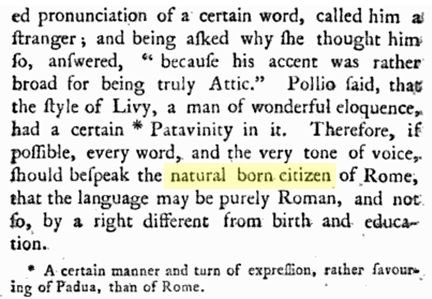
Posted on 05/12/2010 12:36:53 PM PDT by rxsid
Article II, Section 1, Clause 5 from the U.S. Constitution states:
"No person except a natural born citizen, or a citizen of the United States, at the time of the adoption of this Constitution, shall be eligible to the office of President; neither shall any person be eligible to that office who shall not have attained to the age of thirty five years, and been fourteen Years a resident within the United States."
Okay, I’ll bite.
The French people raised the money for the statue itself through private donations. It was called “Liberty Enlightening the World.” The Emma Lazarus poem has completely changed the meaning of the statue for most people from the original intent.
What’s your point?
I fail to see how the SOL of 1876 has much relevance to the 1780s.
Why were the people of France so compelled by the concept of Liberty, to have commissioned that gigantic statute as a gift to the United States? What debt of gratitude did the people of France feel they owed us?
Remember, the comment of yours that prompted my reply dealt with Emerich de Vattel and the French Revolution.
And which treatise might that be? Certainly couldn't be Law of Nations, since there was no constitutional republic on the planet when Vattel died.
The US created the very first written constitution and therefore the first constitutional republic.
Vattel was writing for a European audience. The British government of the time, for all its flaws, was more free than any European government with the arguable exception of some of the Swiss cantons and the Netherlands. Or perhaps Poland, if you were an aristocrat. Of course, the Polish aristocrats were at the time in the process of destroying their nation with that freedom.
The United States was the result of the first successful revolution against the monarchical/aristocratic Old Regime that ruled most of the world.
The French apparently felt they owed a debt to Americans as their revolution was in some sense a followup to ours. Although theirs, IMO, went wildly off the tracks due to it being based on a completely different philosophical basis from ours.
I realize you think you’re leading me into a logical trap with these questions, but I really wish you’d jump ahead to the gotcha, as I have other things to do.
Some account of the life, writings, and speeches of William Pinkney
Lots of Vattel and Law of Nations.Chap 212 discussed.
Elements of international law: with a sketch of the history of the science
By Henry Wheaton
History of the law of nations in Europe and America: from the earliest times ...
By Henry Wheaton
Run along, then, I certainly don't want to detain you from Very Important Things, lol.
1773 Vattel French Edition
1773 Vattel French Edition
A 1760 Review of the 1760 English Edition Vattel..The Monthly review, Volume 23
By Ralph Griffiths
Outstanding post!
I'd give anything to see anyone of you on a major news show debating this topic....you would put the “professionals” to absolute shame.
I meant to include you in this post too!
See #137
We had a written constitution, before the Constitution was written. But there are plenty of written constitutions which greatly predate the US, or even the settlement of the Americas.
For example, the Swiss Federal Charter of 1291 which was admittedly only of 3 cantons, but it grew, eventually becoming modern Switzerland.

There have been at least five different English translations of this work and this sentence.
The first was by Guthrie in 1756. Since then, there have been translations by Patsall in 1774 (ABOVE).
Disclaimer: Opinions posted on Free Republic are those of the individual posters and do not necessarily represent the opinion of Free Republic or its management. All materials posted herein are protected by copyright law and the exemption for fair use of copyrighted works.